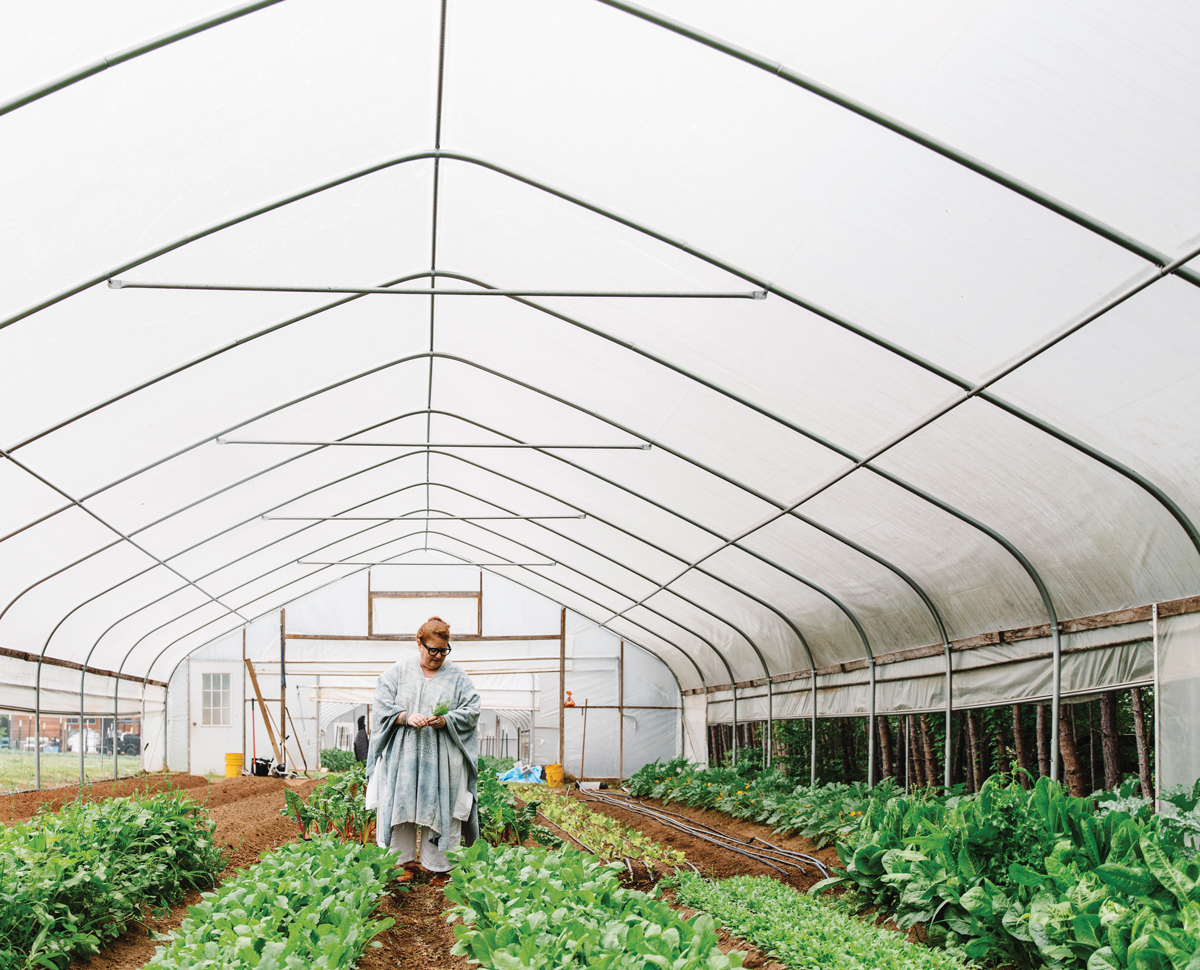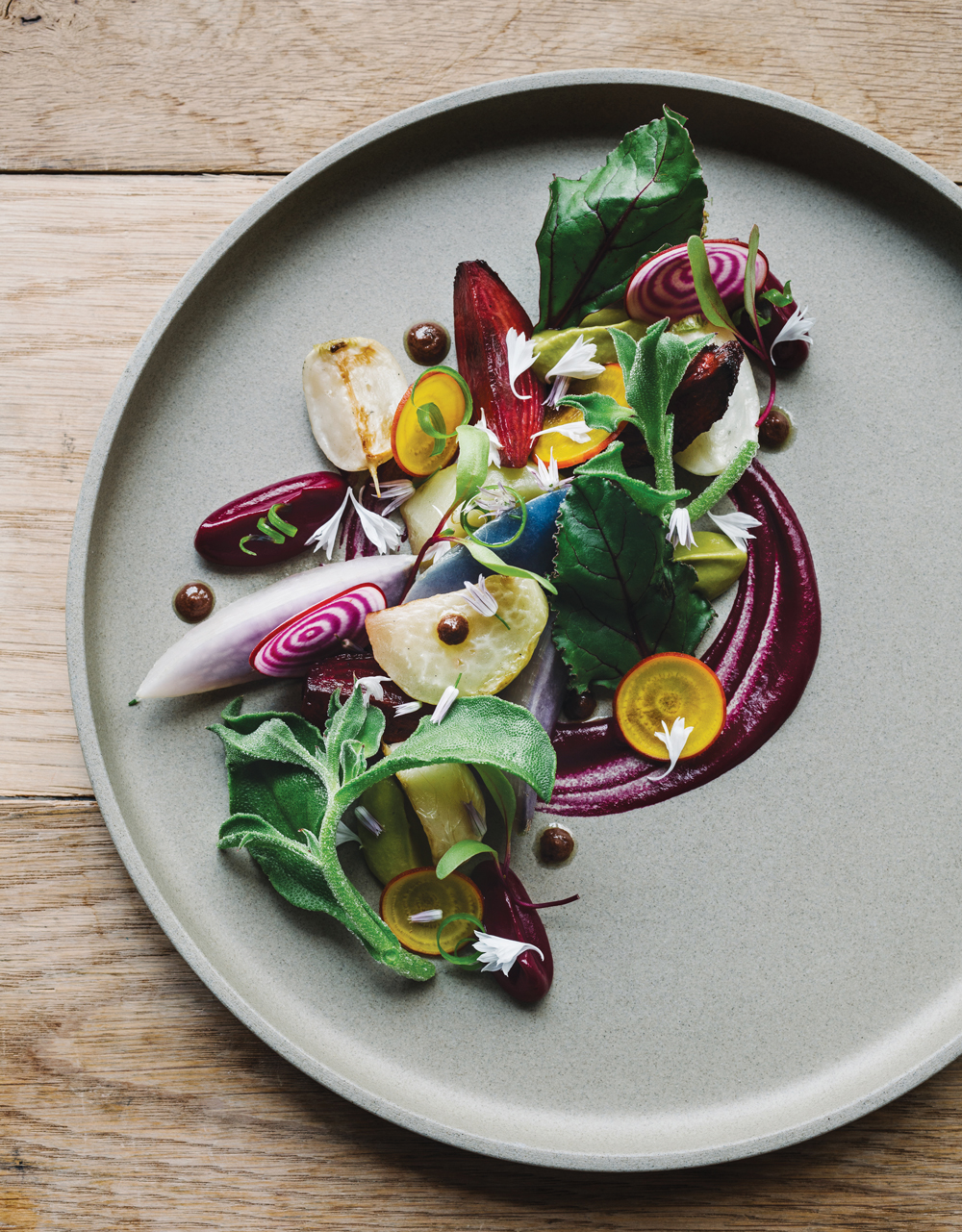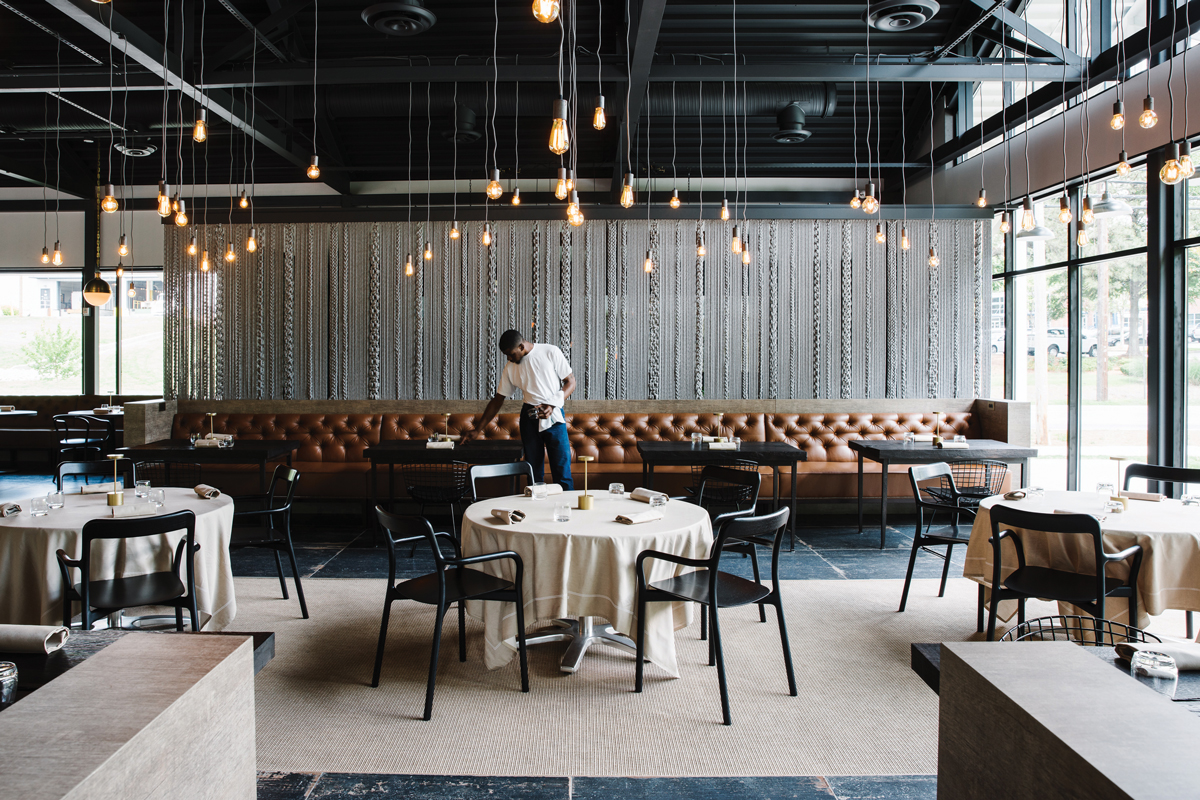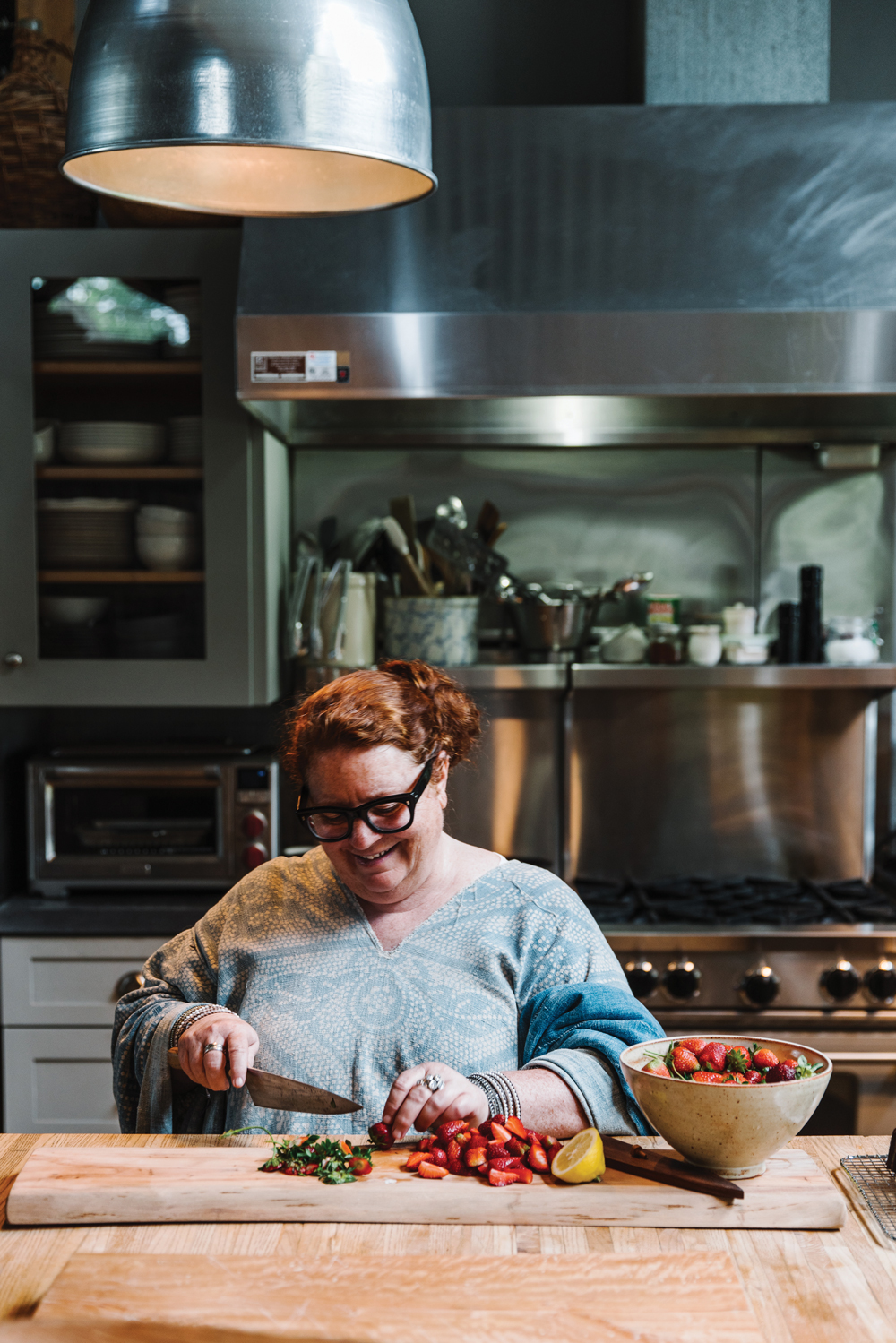
Photograph by Andrew Thomas Lee
One week from opening day, Anne Quatrano sits on a tufted leather banquette that runs half the length of Bacchanalia’s new dining room. Plastic sheets cover the floors and much of the furniture. Stepladders are everywhere. Quatrano’s dog, Stuart, has plunked down on the distressed black tiled floor. Stuart is a Kangal, which means he’s roughly the size of a Shetland pony—only he slobbers more. He rides along with Quatrano during her commute between the city and Summerland, her 60-acre farm in Cartersville. He’s with her as she scours the fridge at home for something to drink after a long day. And Stuart’s with her now, one mammoth paw resting on top of her taupe-colored sneaker, as four men in steel-toed boots lug two armoires inside the space. The cabinets, repurposed from another one of Quatrano’s restaurants, are being maneuvered into an alcove outside Bacchanalia’s new restrooms.
“Can you hold one up?” she asks, to test how a decorative slat of carved wood would look affixed to the top of the armoires. There’s a not-quite-right gap above them, but it might be helped by a little . . . something. “What if it was just lower? Now hold it so it comes . . . yes. No! Down a little. Down down down down down.” One of the men stumbles, and Quatrano grips tighter onto Stuart’s leash. “Shit, do not hurt yourself, Houston.”

Photograph by Andrew Thomas Lee
“Armoire placement” is just one item on Quatrano’s punch list in the precious few days and nights before the first customers arrive at the new Bacchanalia. She also has to call local textile artist Sonya Yong James, so they can schedule the installation of 26 feet of woven fabric that will serve as a divider between the main dining room and three private dining areas. She has to familiarize her cooks with their new kitchen—and find the money to pay them if opening day is delayed. (It always is.) And she has to confirm that the lights will turn on in seven days.
In May 2016 Quatrano announced that after 17 years in Westside Provisions, she was moving Bacchanalia one mile west to Ellsworth Industrial Boulevard. A restaurant’s relocation isn’t usually a big deal, but Bacchanalia has never been just any restaurant. It is Atlanta’s fine-dining bastion, and when it moved from its first home in Buckhead to the Westside back in 1999, it became the lodestar for a generation of Atlanta chefs. Miller Union’s Steven Satterfield, Staplehouse’s Ryan Smith, Empire State South’s Joshua Hopkins, and others all learned under Quatrano’s tutelage. At 58, she has a couple decades on most of her disciples. It’s an age when many of us would start slowing down, but instead she’s making what is arguably her riskiest move ever.
“I don’t really sleep,” confesses Annie, as those who know Quatrano call her. Stuart’s in the backseat of her Ford F-150 now, silent but still drooling, as they make their way to the farm. “This is the part of my life where I’m feeling the most disruption—and the least confidence.”
Over the course of the hour-long drive, concrete sidewalks of suburbia give way to green fields bordering the rough edges of Cartersville’s country roads. Quatrano pulls her truck through the entranceway to Summerland, so named by her Savannah-based ancestors who began using the higher-elevation property as a summer retreat sometime before the Civil War. She parks next to a streamlined American farmhouse that she designed herself: The tin roof and wraparound porches are straight out of the Southern vernacular, but the structure has been dressed up with a cupola and one dramatic central gable. Immediately after she turns off the engine, howls emerge from the snouts of seven dogs. Stuart even speaks up a little. And then a human voice adds to the chorus, “Hi, I’m Cliff.”

Photograph by Andrew Thomas Lee
Quatrano and the man who would become her husband, Clifford Harrison, met in culinary school in San Francisco in the mid-1980s. They both fell for the northern California way of serving food, “flowing and soft and very approachable,” she says. Quatrano’s mentor, Zuni Cafe founder Judy Rodgers, was known for her refined simplicity. Her restaurant “helped transform the way Americans think of food through its devotion to local, seasonal ingredients meticulously prepared,” read Rodgers’s 2013 New York Times obituary.
Annie and Cliff wanted to put that same philosophy to work back east. First they moved to New York City, but the cost of doing business was too high. Meanwhile, down in Georgia, Summerland was just sitting there, vacant—a place to grow the ingredients that could be the foundation for the simplicity and directness they sought. In 1992 they moved home.
Their hunch that Atlanta was ready for that type of food was correct. Back in the 1990s, it was unusual to see a fairytale eggplant anywhere. Not anymore. Annie and Cliff did that. “Farm to table” is a household expression now—so sought after that chefs indiscriminately slap the phrase onto their menus, knowing those words will help sell food even if the kitchen doesn’t practice what that ink preaches—but who else was cooking according to what the region’s soil would turn up each season but Annie and Cliff? They were the first champions of Southern cheese makers like Thomasville’s Sweet Grass Dairy. When Quatrano and Harrison opened Bacchanalia in 1993, the theatrical, technically rigorous Günter Seeger was Atlanta’s most famous fine-dining chef. But it was Annie and Cliff’s cooking that was, quite literally, down to earth.
“Everything just kind of fell out of her hand,” says No. 246 executive chef Drew Belline, who cooked over a span of eight years at both Bacchanalia and Floataway Cafe, Quatrano and Harrison’s breezy California-Mediterranean restaurant on Zonolite Road. “It just looked so natural, like it was just sort of meant to be that way.”
In Quatrano’s mind, food should have very little to do with modern science and very much to do with the classics: nourishment and delight. “Making a perfect curd is really hard, right? Adding gelatin is not hard,” she says, throwing a little shade at the overwrought cooking of molecular gastronomists.

Photograph by Andrew Thomas Lee
A springtime dinner order list from the farm reads: “20 bunches rainbow carrots, 14 bunches tatsoi, 20# bok choy, 12 bunches radishes, micro daikon radishes, 20 kohlrabi, 19 escarole, 50 heads baby romaine lettuce, 7# lettuce mix, 7# ice lettuce, 16 bunches arugula, 4 parsley, 2 dill, micro red sorrel, pea shoots.” Ninety percent of the vegetables at Bacchanalia come from Summerland. The 300 chickens do a lot of work, too. Oysters come from Washington, Maine, and Minnesota, but Quatrano sources ingredients as close to home—if not from her actual home—as she can. Georgia’s lamb isn’t great yet, she says, so she buys hers from Pennsylvania’s Jamison Farm. “They know how to keep the animals’ stress levels down,” says Quatrano, “and they know how long to hang them and at what temperature, so they’re not tough.” A thoroughly spreadable ring of Atlanta’s Banner Butter sits on every dinner table at Bacchanalia.
Quatrano is the first to admit that Harrison is the more proficient chef. Yet while it was Harrison’s technical expertise that allowed him to coax fresh lobster meat toward its sweetest, poached spot, it was Quatrano’s sense of occasion and pacing that made their meals memorable.
“I loved that there were these four courses, starting with this luscious appetizer: the crab fritter or ravioli or something really, really yummy,” says John Kessler, a former restaurant critic for the Atlanta Journal-Constitution, about Bacchanalia’s early years after first opening in 1993. The rhythm of the meal, in other words, started with in-your-face luxury. “Then there would be this really clean entree like you might get in a good Italian restaurant: some beautiful protein with fresh vegetables on the plate.” Then came the cheese course, which was special for two reasons. One, diners couldn’t find excellent Southern cheeses like that anywhere else; Quatrano had the monopoly, simply because no one else was looking for them at the time. Two, Quatrano had an uncanny sense of exactly what to pair with each type of cheese. She mellowed Sequatchie, Tennessee’s funky Shakerag blue, with cool endive slices. She shaved Singing Brook, a nutty aged sheep’s milk cheese from Blackberry Farm, into slivers the same size as the peppery baby arugula leaves they were tossed with. Salty Parmesan called for sweet dates and earthy mushrooms. Throughout these three courses and even after dessert, Quatrano would send gifts: a sip of almost-clear vegetable consommé to start, a madeleine to finish.

Photograph by Andrew Thomas Lee
It was more than the food, though. From the ceramic plates to the silver flatware to the Frette linen napkins, no detail was too small to fuss over, making the restaurant feel both homey and aspirational at the same time. Quatrano’s design philosophy: build something that she wouldn’t just want to dine inside, but that she would want to live inside.
Go to Summerland, and you see the same slightly industrial, slightly rustic, yet totally elegant style. Enter the front door and you’re in the kitchen, which dominates the house. Transom windows on all four sides of the building bring in light that shows off clean Shaker lines, balanced and set off by curves and flourishes. Greige, that earthy-cool mix of gray and beige, is everywhere: There are greige shag pillows on the dining chairs, greige bookshelves in the library above, greige—“We’re going to have to change that,” Quatrano says as she stops dressing arugula and points to a group of white and marigold pitchers atop a greige kitchen cabinet. She prefers her palette monochromatic. “Clifford sometimes takes license with them,” she explains, making a note to re-greige the arrangement later.
She presents as cool, but don’t be fooled: Quatrano is a perfectionist. This is the same woman who placed 16 cameras in and around Star Provisions so she could monitor the business from her home computer.
“Sometimes, after he washes the dishes at home, I put them in the dishwasher,” Quatrano continues, peeling a honeybell orange. “I don’t even think he knows that.”
Quatrano married Harrison in 2002 after her accountant suggested it. The couple had already built a life together, but it would be smart to make it official, said the adviser, for tax purposes. “That’s really the only reason we did,” Quatrano says. “Clifford wanted to more than I did. Honestly, I had seen a really horrible marriage.”
She’s speaking of her own parents, who married only after her mother became pregnant with Annie. They were good Catholics. Her father eventually left their Fairfield, Connecticut, home some nine years later, and while her mother didn’t work when they were children, she wasn’t exactly around. “She just didn’t pay that much attention to us,” Quatrano says, referring to herself and her sister, Frances, now 56. “She played tennis.”
That wouldn’t be Annie. She worked hard to pay for rent during college and for her culinary school tuition. “And I wanted to have money to do what I wanted to do.”
What she wanted to do was be like her paternal grandmother. Nanny, as she was called, shopped at Bonwit Tellers for tailored suits with matching shoes and gloves, which she wore almost every day. She collected china and silver on trips around Europe and New England—much of it is now in Quatrano’s garage—and she entertained frequently, cooking roast beef with James Beard’s Yorkshire pudding. “Annie really followed her around,” says Frances. Nanny was her first culinary professor.
Restaurant work was relatively easy to find on Nantucket, where Quatrano spent summers throughout college, and it provided a way to make good money in just a few months. But Quatrano was also drawn to the high energy of a professional kitchen.
When she was just a year old, Quatrano’s father spotted her trying to climb down the fire escape of the family apartment. As Frances tells the story, “Dad looked out and said, ‘Annie, where are you going?’ She said, ‘I’m going to work.’ She’s just always wanted to work. It’s her life.”
Quatrano’s father passed away two years ago, and she was at his side. Her mother lives on the Summerland property, in a cottage on the Etowah River, near where the strawberries grow. Quatrano just replaced the roof. Frances has run the front of the house for Bacchanalia since day one.
Harrison runs the farm (which includes his 20 horses), manages the restaurants’ food orders, helps run the kitchen at Floataway Cafe a couple nights a week, and travels to play polo. Quatrano is in Atlanta, at the restaurants, almost always. When she’s not there, she’s likely fulfilling duties as the James Beard Foundation awards committee’s chairperson.
“We don’t always agree,” Quatrano says, referring to Harrison. “He’s not as generous as I am, and I don’t need to be as generous as I am, either. I would give away the fucking world, and I think he keeps me on point.” Sometimes there’s palpable tenderness between them, in a smile or a wink. Sometimes they seem more like siblings. There’s no denying, though, that they’re partners. “There’s a yin and a yang that work really well together,” she says.
Quatrano’s true romance is with her restaurants. On Valentine’s Day, she filled Bacchanalia’s dining room with balloons. On Super Bowl weekend, she sent every guest home with a cupcake decorated with a football and a Falcons logo.
“You’re either born with that hospitality in you or you’re not,” she says. One Thanksgiving a Star Provisions customer ordered a prepared turkey, assuming that it would come carved. When it arrived whole (as intended), the customer called, frantic. Quatrano drove 45 minutes to carve it herself. She arranged the meat in a pan, preheated the oven so the customer could warm the turkey before dinner, and returned to the restaurant.
“I always felt that little bit of relief when I could go upstairs and expedite or cook,” says Quatrano, who was named the 2003 James Beard Foundation Best Chef: Southeast. (This was, of course, before she was on the committee.) “For four or five hours a night, everything else took second place. And everything else is all-consuming to me now.” Does she have the right Comcast plan? Is the health insurance she chose good enough for her staff? Is it the best price she can get? She’ll answer emails until midnight just to keep up.

Photograph by Andrew Thomas Lee
Bacchanalia 2.0 opened in 1999, and Taqueria del Sol opened soon after. Adjacent to both restaurants was: nothing. The Westside was undiscovered country back then, when both Quatrano and Taqueria’s Mike Klank made the pioneering move to the then industrial area. Now there’s a Steven Alan selling $400 silk jumpsuits and an apothecary that offers small-batch, handcrafted, self-care products. Westside Provisions is one of the city’s hottest shopping destinations because Bacchanalia blazed the trail.
“Honestly, I would have stayed there forever,” says Quatrano, “but I couldn’t afford it anymore.” At the end of March, her lease with Jamestown Properties was up, and so was the rent. Star Provisions, which Jamestown president and principal Michael Phillips convinced Quatrano to add to Bacchanalia, suffered a 30 percent sales loss in 2015. Quatrano believes that the parking spaces coopted by nearby construction had something to do with it. “People need to be able to pull up, walk in the door, get some bread, and pull out.”
Any solutions she and Phillips devised involved moving Bacchanalia downstairs, where the offices and storage were, and shifting Star Provisions back into the Bacchanalia space. “That felt like a disservice to a business that’s 24 years old,” Quatrano says, her gaze fixed through her glossy black-rimmed eyeglasses and straight onto the wood exterior of the new Bacchanalia and Star Provisions on Ellsworth. “That would not have been a fitting resting place for the businesses we’ve built up.”
So Quatrano searched for a new home for them, settling on this stretch of Ellsworth because she’s partial to the Westside and there’s ample parking. “I did not think I was done,” she says, “and I did not feel like Bacchanalia was done.”
Aside from her home, this is the only building she’s architected from the ground up. She’s done it with the help of her new landlords, Stream Realty Partners; her builders, Structor Group; her designers at Perkins + Will; and a $500,000 loan from American Express. It’s 8,717 square feet as opposed to 16,500, and while Quatrano says she misses some of the “extraneous space we were used to,” she’s quick to add that “we’re very happy.”
The constellation of restaurants Quatrano owns and runs include Star Provisions and its sandwich shop; Floataway Cafe; and W.H. Stiles Fish Camp, a New England–style fish shack she nicknamed “Dubs,” in Ponce City Market. Plenty of people would be satisfied—and more than busy—with that. They might have used the loss of Bacchanalia’s lease as an opportunity to start peeling back.
This never occurred to Quatrano. “I mentioned maybe five years ago, ‘Do we have like a retirement idea or exit plan or something?’ She looked at me like I was crazy,” Frances says. “So no, none of that. We’re not retiring.”
If you dined at Bacchanalia on Howell Mill in its last few years, you might have had the coddled egg with spinach and Parmesan cheese. It was served with soldiers—strips of toast, ubiquitous on English breakfast tables—that were pure Annie. Every edge of each had been brushed with butter and seared until crispy. A normally dry, commonplace food item had been wrought into something sybaritic.
Servers darted around the room in Mandarin-collared uniform jackets. They were swift, efficient, attentive, and they worked every corner of the angular space. The only thing that moved more was the cheese cart. Lead-footed, with a polished, dark wood base, it glided against the carpet floor a little slower than the staff, but it touched every table.
Second-course veal sweetbreads were plated to one side, leaving the majority of the dish’s surface blank. Here and there, swoops of amber sauce. This negative space, these “bits and bobs,” as Kessler calls them, felt too trendy to be Annie.

Photograph by Andrew Thomas Lee
Bill Addison, the former food editor and dining critic for Atlanta magazine who’s now the national food critic for Eater, urged Quatrano to innovate further in a 2011 review that bemoaned a kind of tarnish that he saw starting to show at Bacchanalia. Later that year, Creative Loafing’s Besha Rodell wondered if critics were holding Bacchanalia to an unrealistic standard. “Sometimes I wonder if we aren’t asking too much of this restaurant,” she wrote. “If its owners and chefs hadn’t made it abundantly clear that they aim to be the best in the region, we might allow the restaurant to just go ahead and be what it is: the grande dame of the farm-to-table movement.”
Quatrano doesn’t plan on cooking for critics in this next stage. “There is a lot of overthinking of food now, and I’m not interested in that,” she says. “I get blue in the face sometimes. Last night I kept asking my chefs to make a simple little hasselback potato, and they pushed back. But, I mean, hasselback potatoes are so awesome! Just perfect.”
Her cooks eventually made them, and they agreed: The potatoes were perfect. “The best that we can do now is to really cook what’s closest to our heart, what we feel the most strongly about.
“This is our end, right?” she wonders aloud. “We’re going into probably our last 10 years of being in this, as completely as we are now, and we want to leave a bit of a legacy.” When asked what that legacy is, Quatrano says simply that she wants “to continue to serve delicious food to our guests in our lovely new space. . . This is really, really important to us.”
On opening night, the cheese cart still roamed Bacchanalia, but the room felt less formal with those black tiles instead of carpeting. It was still elegant—the brushed brass table lamps playing off of the putty-colored braided rope hanging from the ceiling—but a little more relaxed. Quatrano placed outlets at each table in case diners want to charge their phones. Servers still wear their white jackets but underneath were blue jeans instead of black slacks. The building has one kitchen instead of three.
As for the cameras, they’re installed. Only now Quatrano can check the video feed directly from her iPhone.
More from this story
We couldn’t fit everything Quatrano told us into a single feature, so we rounded up some of highlights from the cutting room floor. Learn what she had to say about gender in the kitchen, serving food that diners want, and good business.
This article originally appeared in our June 2017 issue.













